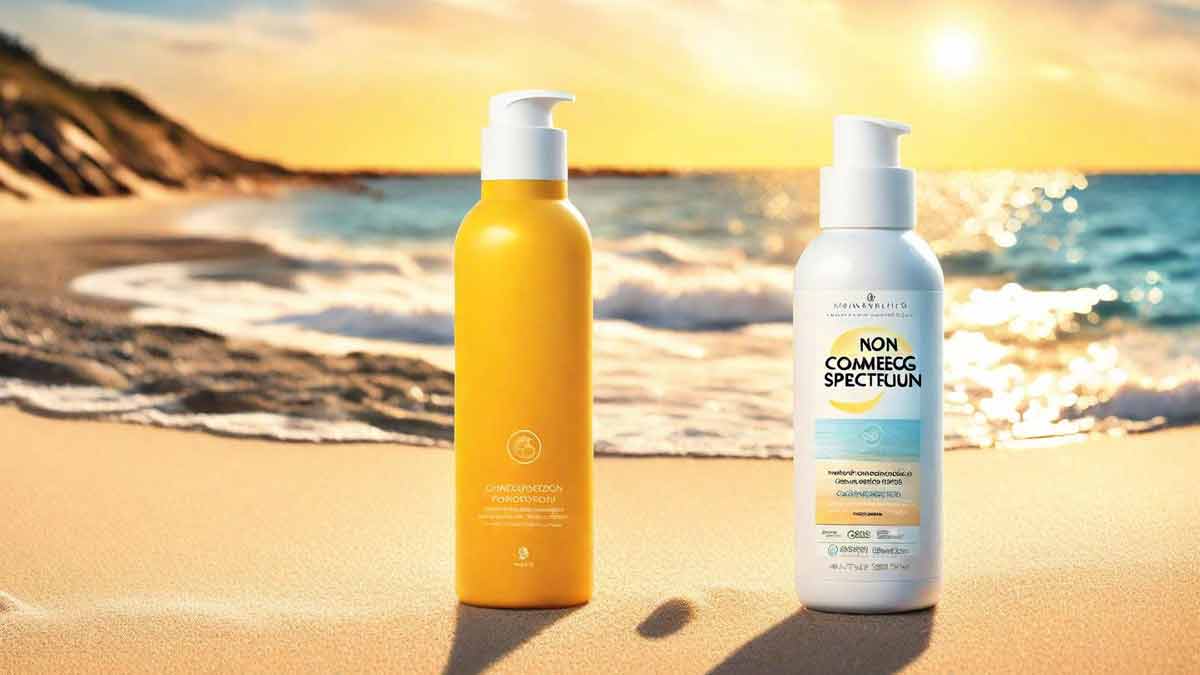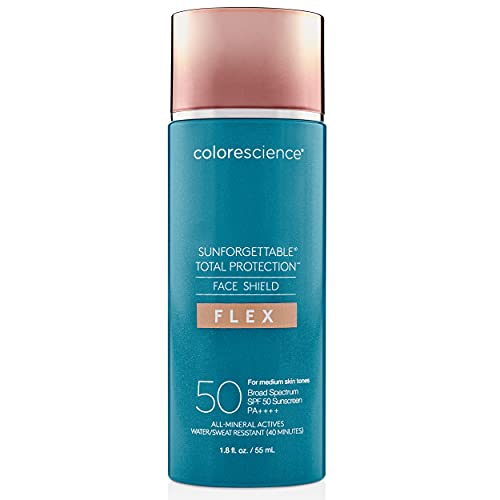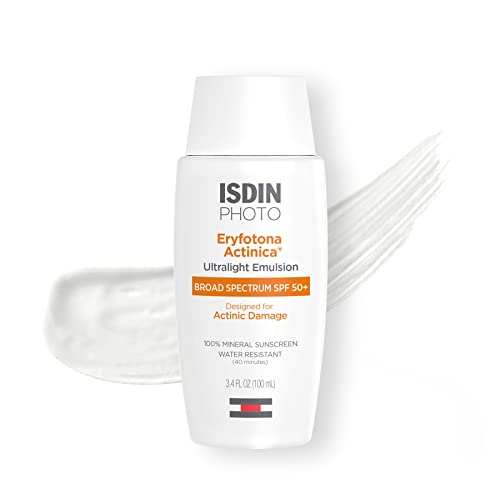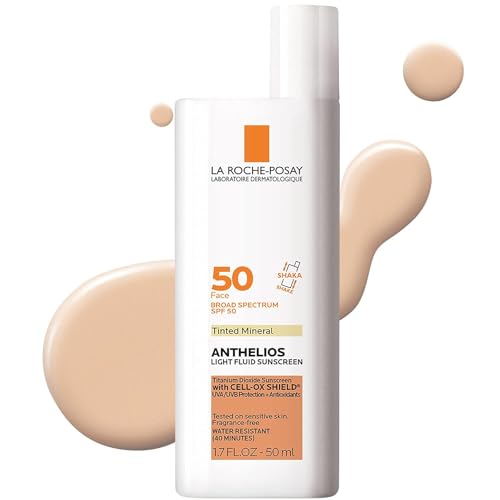If you’ve got acne-prone skin, you’ve probably been through the wringer trying to find the right sunscreen. You know, the one that shields you from those pesky UV rays without turning your face into a breakout bonanza. It’s like finding a needle in a haystack, but fear not—your quest ends here.
First off, let’s talk UV rays and acne. It’s a complicated relationship. On one hand, some sun exposure might seem to help clear up your skin, but don’t be fooled—that’s a fling, not a long-term relationship. UV rays can actually inflame your skin, potentially leading to more acne breakouts and even causing skin cancer down the road.
More from Glowing Gorgeous: Find out here the Best Silicone-Free Moisturizers And Why Do You Care
And let’s not forget about UVB rays, the ones that are especially good at burning your skin and contributing to skin cancer. Not exactly what you’d call ‘BFF material’.
Now, for the plot twist: while you absolutely need sun protection to fend off those harmful UV rays, the wrong sunscreen can clog your pores something fierce. And clogged pores are like a party invitation for acne breakouts.
Key Takeaways
- Choose a sunscreen that is non-comedogenic and oil-free to avoid triggering breakouts.
- Look for sunscreens with zinc oxide and titanium dioxide, as these ingredients are effective in protecting against harmful UV rays.
- Opt for physical sunscreens, which contain zinc oxide or titanium dioxide, as they are less likely to cause breakouts.
- Avoid sunscreens with avobenzone, oxybenzone, fragrances, and dyes, as these ingredients can irritate the skin and cause breakouts.
Mineral sunscreens, containing ingredients like titanium dioxide, sit on top of the skin and reflect UV rays like a mirror. They’re less likely to cause irritation, making them a solid choice for sensitive skin types. Chemical sunscreens, on the other hand, absorb UV rays before they can do their dirty work.
Now, let’s talk about the term “broad-spectrum SPF.” This little phrase is your guarantee that the sunscreen protects against both UVA (the aging rays) and UVB rays. And when it comes to SPF numbers, higher isn’t always better for acne-prone skin.
You want a sunscreen SPF that’s at least 30 to 50 for the right balance of protection and comfort. Protection is the name of the game, and the best sunscreen for acne prone skin is one that offers a solid defense while keeping your pores as clear as the summer sky. And hey, if it can help fade those dark spots and acne scars, even better.
So, when you’re browsing the shelves or clicking through pages, keep an eye out for “non-comedogenic” on the label—that’s code for ‘won’t clog pores’. In the end, it’s all about finding that sweet spot: a sunscreen that offers the protection you need without triggering breakouts. It’s a delicate balance, but with the right sunscreen, clear skin and sun safety can go hand in hand.
What to Look for in Sunscreens for Acne-Prone Skin
You, savvy shopper that you are, know that the devil’s in the details—or in this case, the ingredient list. So, let’s crack the code on those labels and get you prepped to pick the best sunscreen for your acne-prone skin.
First up, “non-comedogenic” is your new best friend. This term is a fancy way of saying, “Hey, I won’t clog your pores!” And when you’re prone to acne, clogged pores are enemy number one.
Next, keep your peepers peeled for “oil-free.” Oily skin and extra oil? No, thank you. You want a sunscreen that plays nice with your skin’s natural oils without going overboard. Now, let’s chat about “broad-spectrum SPF.” This is your all-access pass to protection from both UVA and UVB rays. UVA rays are like the ninjas of the sunlight world—they sneak through windows and clouds, contributing to sun damage and, you guessed it, more visible signs of aging.
UVB rays, those are the bouncers of the sun world, causing sunburns and playing a major role in skin cancer. A broad-spectrum SPF has got you covered on all fronts. When it comes to ingredients, zinc oxide and titanium dioxide are the dynamic duo in mineral sunscreens. They’re gentle on sensitive skin and less likely to trigger a breakout.
More from Glowing Gorgeous: Find out here Hyram’s Recommended Face Sunscreens For The Summer
For those with a darker skin tone, fear not—new formulations are designed to blend seamlessly without leaving that dreaded white cast. But wait, there’s more! If you’re into the idea of a natural sunscreen for acne-prone skin, you’ll want to look for zinc oxide as a key player. It’s a mineral that provides physical sunscreens their clout.
And for a hydration boost, keep an eye out for hyaluronic acid in the ingredient list—it’s like a tall drink of water for your skin, minus the breakouts.
Now, for acne-prone folks, the thought of slathering on a cream might seem about as appealing as a high school reunion. But there’s good news: sunscreen comes in all sorts of textures these days. You’ve got lightweight lotions, featherweight fluids, and even powders that’ll keep your face matte and your pores happy.
So, before you throw in the towel and grab the first sunscreen you see, take a moment to decode that label. Your skin will thank you—with fewer breakouts, less irritation, and all the sun protection you need to keep those harmful UV rays at bay. And remember, the right sunscreen isn’t just a summer fling; it’s a year-round commitment to your skin’s health.
The Great Debate: Physical vs. Chemical Sunscreens
The sunscreen aisle can sometimes feel like you’re stepping into a debate club meeting. On one side, you’ve got physical sunscreens, also known as mineral sunscreens. These guys use natural screens like zinc oxide and titanium dioxide to create a barrier that reflects UV rays away from the skin. They’re like the bouncers outside the club, saying, “Not on my watch!” Mineral sunscreens are typically kinder to sensitive skin and sit on top of the skin without diving into pores, making them less likely to cause breakouts.
On the flip side, chemical sunscreens absorb into the skin and then absorb UV rays, convert them into heat, and release them from the body. They’re the undercover agents of the sunscreen world. But here’s the rub: some chemical ingredients can be a bit too harsh for acne-prone and sensitive skin types, leading to irritation or, you guessed it, more acne.
So, what’s the verdict? If you’ve got acne-prone skin, you may want to lean towards mineral sunscreens. They’re less likely to cause drama and offer protection without the risk of aggravating your skin. And if you’re worried about that notorious white cast, newer formulations have improved significantly, offering clear or tinted options that blend beautifully with your skin tone.
The Lowdown on SPF Numbers
SPF, or Sun Protection Factor, is like the scoreboard for how well your sunscreen will protect you against UVB rays—the ones responsible for sunburn and contributing to skin cancer. But don’t get it twisted; higher SPF doesn’t mean all-day protection. No matter if it’s SPF 30 or SPF 100, you need to reapply every two hours or immediately after swimming or sweating buckets.
For acne-prone skin, SPF 30 to 50 is the sweet spot. It offers robust protection without the need for excessive reapplication, which can irritate the skin and lead to more breakouts. Always remember, a higher SPF number does not give you a free pass to skip reapplication!
Ingredients to Avoid Like the Plague
If your skin throws a fit at the mere mention of acne, you’ll want to steer clear of certain ingredients in sunscreens. Oils like coconut oil might be great for a piña colada, but they’re a no-go for your face if you’re prone to acne. Fragrances and PABA are also on the no-fly list—they can irritate your skin faster than you can say “breakout.”
Another sneaky culprit is alcohol, which can dry out your skin. And while that might sound good if you’ve got an oily complexion, it can actually backfire by prompting your skin to produce even more oil to compensate. Talk about a double-edged sword.
The Best Sunscreens for Acne-Prone Skin, Handpicked by Dermatologists
Now, let’s cut to the chase and talk about the crème de la crème of sunscreens that won’t turn your face into a battleground for breakouts. These picks come straight from the pros, so you know they’ve got the creds to keep your skin in the clear.
First off, the EltaMD UV Clear Broad-Spectrum SPF 46 is like the holy grail for those with acne, oily skin, and sensitive skin all rolled into one. It’s got niacinamide, which is basically skincare speak for ‘helps calm inflammation and redness’. Plus, it’s as light as a feather, so you won’t feel like you’re wearing a face mask all day.
Another gem is the La Roche-Posay Anthelios Clear Skin Oil-Free SPF 60. This superstar is a triple threat: it’s oil-free, it dries down matte (so long, shiny forehead), and it’s formulated with a high spectrum SPF for top-notch protection. It’s like a velvet glove for your skin—gentle yet powerful.
For those who prefer a mineral-based formula, the Colorescience Sunforgettable Total Protection Face Shield SPF 50 is a standout. It’s a physical sunscreen that uses, you guessed it, titanium dioxide to bounce those UV rays right off your skin. And it’s got a universal tint to boot, so it’ll enhance any skin tone without leaving you looking ghostly.
But wait, there’s more! If you’re battling oily skin and want a product that understands the struggle, reach for the Eucerin Sun Oil Control SPF 50. This one’s got lactic acid to help keep those dead skin cells from causing chaos, and it’s a whiz at managing shine.
Let’s not forget the Murad City Skin Age Defense Broad-Spectrum SPF 50. This tube of magic not only shields spf like a champ but also comes packed with antioxidants to fend off pollution and blue light. Talk about a multitasker!
And for the sensitive skin crowd, the Dermalogica Prisma Protect SPF 30 Moisturizer is a gentle giant. It’s got hyaluronic acid for that splash of hydration and a broad spectrum spf to keep you covered. Plus, it doubles as a moisturizer, so you can streamline your routine and still feel protected.
Remember, the best sunscreen for you is the one you’ll actually use—so find a formula that feels good, fits your skin type, and doesn’t leave you dreading your morning routine. With these dermatologist-approved options, you’re well on your way to enjoying clear skin and confidence, no matter how bright the sun shines.
Top Picks for Every Budget
Whether you’re pinching pennies or ready to splurge on your skin, there’s a sunscreen out there with your name on it. For those looking to save without sacrifice, Bondi Sands Fragrance Free Daily Sunscreen Face Lotion SPF 50 is a wallet-friendly wonder that offers broad-spectrum protection without leaving your skin slick or your pores clogged.
The La Roche-Posay Anthelios UV Correct Sunscreen Moisturizer SPF 70 . It offers high SPF protection and a formula that targets imperfections for a clearer, more radiant complexion.
And for those who don’t mind dropping a few extra dollars for deluxe skin defense, the ISDIN Eryfotona Actinica Zinc Oxide and 100% Mineral Sunscreen Broad Spectrum SPF 50+ is a dermatologist darling for a reason and is worth every penny. It’s a multitasker that not only keeps your skin safe from the sun but also helps to soothe and improve the appearance of acne-prone skin over time.
Best Tinted Options for a No-Makeup Glow
Tinted sunscreens are the Swiss Army knives of the skincare world, especially for those who want a dash of color with their sun protection. EltaMD’s UV Clear Tinted Broad-Spectrum SPF 46 is a fan favorite, offering a hint of hue to even out your skin tone while warding off future breakouts and UV damage.
For a sheer touch that complements your natural glow, MDSolarSciences Mineral Tinted Crème SPF 30 Sunscreen for Face is your go-to. It’s a mineral sunscreen that not only plays nice with acne-prone skin but also comes with a built-in tint to blur imperfections and enhance your skin’s natural beauty.
Sensitive Skin Saviors
Sensitive skin requires a gentle touch, and when it comes to sunscreens, the last thing you want is a formula that feels like you’re applying a cactus to your face. Enter the world of sensitive skin saviors. Replenix Hydrating Antioxidant Tinted Mineral Sunscreen with Medical-Grade Zinc is a standout, offering high-performance protection with a feather-light feel that won’t leave your skin screaming for mercy.
Another hero in this category is the EltaMD UV Clear Broad-Spectrum SPF 46 (again), which not only shields your delicate skin from UV rays but also from pollutants and digital blue light. It’s a modern shield for the modern world, keeping your skin calm, cool, and collected.
How to Layer Sunscreen with Your Acne Treatments
Mastering the art of layering skincare products is like becoming a black belt in karate—it takes practice, patience, and the right moves. So, let’s break down the steps to seamlessly incorporate sunscreen into your acne-fighting regimen.
Step 1: Start with a clean canvas. Use a gentle cleanser to remove any oil, dirt, or last night’s skincare. Pat your skin dry with a soft towel—no rubbing, please.
Step 2: Apply any acne treatments you use, whether it’s a spot treatment with salicylic acid or a full-face product. These go on first because they need to be closest to the skin to work their magic.
Step 3: Moisturize next. If you’ve got oily skin, opt for a lightweight, oil-free moisturizer. Give it a minute to sink in. Your skin should feel hydrated, not like it took a dip in a grease vat.
Step 4: Now, the main event: sunscreen. Apply a generous amount (about a nickel-sized dollop for the face) of your chosen sunscreen. If it’s a physical sunscreen, you can go ahead and apply makeup right after. If it’s a chemical sunscreen, wait about 15 minutes to let it fully absorb and get to work.
Step 5: If you’re using a tinted sunscreen, you might find you can skip foundation altogether. If not, go ahead and apply your makeup as usual.
Reapplication Tips: Let’s be real, nobody wants to redo their entire face halfway through the day. So, here’s the trick: use a setting spray with SPF or a powder sunscreen. Both can be applied over makeup without messing up your masterpiece. Just a few spritzes or a light dusting every couple of hours, and you’re good to go.
Remember, the right sunscreen won’t pill or cause irritation when layered correctly with your other skincare products. It should glide on smoothly, leaving you ready to face the day (pun intended) with a high level of protection against those UV rays. With these application tips, you’ll keep your skin safe and your acne treatments effective, without any midday makeup meltdowns.
Can Sunscreen Actually Cause Acne?
Whispered through the grapevines of skincare forums and social media, myths about sunscreen causing acne have made many an acne-prone individual wary. But it’s time to set the record straight and dispel the rumors once and for all.
Here’s the deal: not all sunscreens are created equal, and yes, some can cause acne—if you’re not using the right one for your skin type. The culprits are usually heavy, greasy formulas that can block pores, leading to those dreaded breakouts. But this doesn’t mean that sunscreen itself is the enemy. It’s all about finding the right one that agrees with your skin.
The truth is, many sunscreens nowadays are specifically formulated to be non-comedogenic, meaning they won’t clog your pores. Ingredients like zinc oxide and titanium dioxide in mineral sunscreens are less likely to irritate or cause acne. Plus, advancements in formulations have led to lighter, more wearable options that provide protection without the breakout backlash.
So, let’s bust this myth: sunscreen does not inherently cause acne. The key is choosing a sunscreen that’s suitable for acne-prone skin—look for labels like ‘oil-free,’ ‘non-comedogenic,’ and ‘fragrance-free’ to keep your skin clear and happy under the sun.
FAQ’s
FAQ: What’s the best type of sunscreen for acne-prone skin?
The best type of sunscreen for acne-prone skin is usually a mineral sunscreen with zinc oxide or titanium dioxide. These ingredients are less likely to cause irritation or clog pores. Look for products labeled ‘non-comedogenic,’ ‘oil-free,’ and ‘broad-spectrum SPF’ to ensure you’re getting effective protection without aggravating your skin.
FAQ: Can wearing sunscreen help prevent acne scars?
Absolutely! Sunscreen not only protects your skin from harmful UV rays but also helps prevent dark spots and scars from becoming more pronounced. By reducing sun exposure, you minimize the chances of existing acne scars darkening, helping your skin maintain a more even tone.
FAQ: How often should I reapply sunscreen if I have acne-prone skin?
No matter your skin type, you should reapply sunscreen every two hours, and immediately after swimming or sweating. If you have acne-prone skin, opt for a lightweight, non-comedogenic formula for reapplication, especially if you’re also wearing makeup.
FAQ: Can I skip moisturizer if my sunscreen is hydrating?
It depends on your skin’s needs. If your sunscreen contains moisturizing ingredients like hyaluronic acid and it provides enough hydration for your skin, you may be able to skip a separate moisturizer. However, if your skin is particularly dry or dehydrated, you might want to use both for optimal skin health.
FAQ: Is sunscreen necessary if my makeup has SPF?
While makeup with SPF does provide some protection, it’s usually not enough to fully shield your skin from UV rays. It’s often applied too thinly to reach the SPF level on the label. For best protection, apply a dedicated sunscreen under your makeup, even if it already contains SPF.
To maintain the reliability of my content, I refer to scholarly articles, reputable academic sources, and the perspectives of certified healthcare professionals.


 EltaMD UV Clear Face Sunscreen, SPF 46 Oil Free Sunscreen with Zinc Oxide,...
EltaMD UV Clear Face Sunscreen, SPF 46 Oil Free Sunscreen with Zinc Oxide,... La Roche-Posay Anthelios Clear Skin Dry Touch Sunscreen SPF 60, Oil Free Face...
La Roche-Posay Anthelios Clear Skin Dry Touch Sunscreen SPF 60, Oil Free Face... Colorescience Total Protection Face Shield Flex SPF 50, Zinc Oxide Formula,...
Colorescience Total Protection Face Shield Flex SPF 50, Zinc Oxide Formula,... Eucerin Sun Clear Skin SPF 50 Face Sunscreen Lotion, Hypoallergenic, Fragrance...
Eucerin Sun Clear Skin SPF 50 Face Sunscreen Lotion, Hypoallergenic, Fragrance... Murad Environmental Shield City Skin Age Defense Broad Spectrum SPF 50-100%...
Murad Environmental Shield City Skin Age Defense Broad Spectrum SPF 50-100%... Dermalogica Prisma Protect SPF 30 Sunscreen Moisturizer (0.4 Fl Oz) Hydrate,...
Dermalogica Prisma Protect SPF 30 Sunscreen Moisturizer (0.4 Fl Oz) Hydrate,... Bondi Sands Fragrance Free Daily Sunscreen Face Lotion SPF 50 | Hydrating UVA +...
Bondi Sands Fragrance Free Daily Sunscreen Face Lotion SPF 50 | Hydrating UVA +... La Roche-Posay Anthelios UV Correct Sunscreen Moisturizer SPF 70, Daily...
La Roche-Posay Anthelios UV Correct Sunscreen Moisturizer SPF 70, Daily... ISDIN Eryfotona Actinica Zinc Oxide and 100% Mineral Sunscreen Broad Spectrum...
ISDIN Eryfotona Actinica Zinc Oxide and 100% Mineral Sunscreen Broad Spectrum... EltaMD UV Clear Tinted Face Sunscreen, SPF 46 Oil Free Sunscreen with Zinc...
EltaMD UV Clear Tinted Face Sunscreen, SPF 46 Oil Free Sunscreen with Zinc... Replenix Hydrating Antioxidant Tinted Mineral Sunscreen with Medical-Grade Zinc,...
Replenix Hydrating Antioxidant Tinted Mineral Sunscreen with Medical-Grade Zinc,...
 La Roche-Posay Anthelios Melt-In Milk Body & Face Sunscreen SPF 60, Oil Free...
La Roche-Posay Anthelios Melt-In Milk Body & Face Sunscreen SPF 60, Oil Free... La Roche-Posay Anthelios Tinted Sunscreen SPF 50, Ultra-Light Fluid Broad...
La Roche-Posay Anthelios Tinted Sunscreen SPF 50, Ultra-Light Fluid Broad... innisfree Daily UV Defense Sunscreen Broad Spectrum SPF 36 Face Lotion, 1.69 Fl...
innisfree Daily UV Defense Sunscreen Broad Spectrum SPF 36 Face Lotion, 1.69 Fl...
Comments